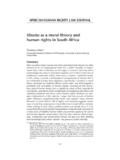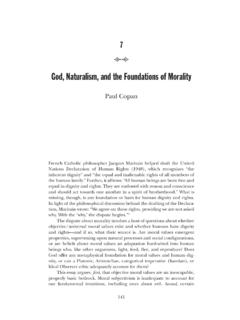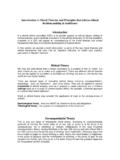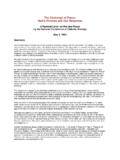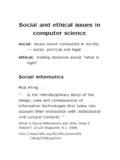Transcription of S. Matthew Liao Adam Etinson Abstract
1 1 Political and naturalistic Conceptions of human rights : A False Polemic? (Forthcoming in the Journal of moral Philosophy) S. Matthew Liao New York University Adam Etinson McGill University Abstract What are human rights ? According to one longstanding account, the naturalistic conception of human rights , human rights are those that we have simply in virtue of being human . In recent years, however, a new and purportedly alternative conception of human rights has become increasingly popular. This is the so-called Political conception of human rights , the proponents of which include John Rawls, Charles Beitz, and Joseph Raz. In this paper we argue for three claims. First, we demonstrate that naturalistic Conceptions of human rights can accommodate two of the most salient concerns that proponents of the Political conception have raised about them. Second, we argue that the theoretical distance between naturalistic and Political Conceptions is not as great as it has been made out to be.
2 Finally, we argue that a Political conception of human rights , on its own, lacks the resources necessary to determine the substantive content of human rights . If we are right, not only should the naturalistic conception not be rejected, the Political conception is in fact incomplete without the theoretical resources that a naturalistic conception characteristically provides. These three claims, in tandem, provide a fresh and largely conciliatory perspective on the ongoing debate between proponents of Political and naturalistic Conceptions of human rights . Keywords human rights ; philosophical foundation; political conception ; practical conception ; naturalistic conception ; orthodox conception ; Charles Beitz; Joseph Raz; John Rawls; James Griffin; John Tasioulas I. Introduction What are human rights ? What makes them different from other kinds of rights ? One intuitive and longstanding response to these questions is that, unlike other kinds of rights , human rights are those that we have simply in virtue of being human .
3 For example, John Simmons writes, 2 human rights are rights possessed by all human beings (at all times and in all places), simply in virtue of their humanity. 1 Following Charles Beitz, we shall call this the naturalistic conception of human In recent years, however, a new and purportedly alternative conception of human rights has become increasingly popular. This is the so-called Political conception of human rights , one of the first statements of which can be found in John Rawls s theory of international justice, The Law of Since the appearance of that work, other prominent political philosophers, including Joseph Raz and Beitz himself, have also defended the Political According to the Political conception of human rights , the distinctive nature of human rights is to be understood in light of their role or function in modern international political practice. As Beitz puts it: Questions like What are human rights ?, What human rights do we have?, and Who has duties to act when human rights are violated?
4 Are understood to refer to objects of the sort called human rights in contemporary international life, however these are best Moreover, proponents of the Political conception believe that the naturalistic conception of human rights should be rejected in favor of its Political counterpart. According to Beitz, naturalistic Conceptions tend to distort rather than illuminate international human rights practice. 6 Similarly, Raz argues that naturalistic Conceptions fail either to illuminate or to criticise the existing human rights practice. 7 In this paper we argue for three claims. First, we demonstrate that naturalistic Conceptions of human rights can accommodate two of the most salient concerns that proponents 3 of the Political conception have raised about them (Sections III and IV). Second, we argue that the theoretical distance between naturalistic and Political Conceptions is not as great as it has been made out to be, and that in fact the two conceptions can in principle agree on a host of important philosophical and practical matters (Section V).
5 Finally, we argue that a Political conception of human rights , on its own, lacks the resources necessary to determine the substantive content of human rights (Section VI). If we are right, pace proponents of the Political conception , not only should the naturalistic conception not be rejected, the Political conception is in fact incomplete without the theoretical resources that a naturalistic conception characteristically provides. These three claims, in tandem, provide a fresh and largely conciliatory perspective on the ongoing debate between proponents of Political and naturalistic Conceptions of human rights . To start, we shall provide an overview of different ways of understanding the Political conception . II. Political Conceptions of human rights As mentioned above, the Political conception is committed to understanding the distinctive nature of human rights in light of their role or function in modern international political practice. Those who take up the Political conception have offered different accounts of what this role or function consists in.
6 According to Rawls, human rights are a class of rights that play a special role in a reasonable Law of Peoples; they restrict the justifying reasons for war and its conduct, and they specify limits to a regime s internal autonomy. 8 More specifically, a society s observance of 4 human rights is necessary for the society to be a member in good standing in a reasonably just Society of People and is sufficient to exclude justified and forceful intervention by other peoples. 9 human rights , Rawls tells us, are Necessary conditions of any system of social cooperation. When they are regularly violated, we have command by force, a slave system, and no cooperation of any kind. 10 Moreover, if a society fails to observe human rights , then, according to Rawls, it cannot complain if external agents interfere in its internal affairs, , by means of economic or political sanction, or even coercive Raz agrees with Rawls s idea that human rights characteristically set limits to a society s internal But Raz s account differs from Rawls s in two main respects.
7 First, Raz argues that while human rights are primarily rights against states, human rights can be held against international agents and organizations of all sorts, including individuals, groups, corporations, and other potential violating domestic Second, Raz argues that Rawls fails to distinguish between the limits of sovereignty and the limits of legitimate Rawls holds that human rights are necessary conditions of any system of social cooperation, and he believes that conditions of social cooperation can determine the limits of sovereignty. But Raz argues that not every action that exceeds a state s legitimate authority can be a reason for interference by other states. For instance, a state can sometimes be protected from external interference even if it lacks internal legitimacy ( , if the external agents are themselves biased and corrupt). If so, the conditions of social cooperation alone cannot determine the limits of sovereignty. Beitz argues that the current role of human rights in international political practice extends beyond that of the (pro tanto) justification of foreign interference or In 5 particular, it encompasses the broader role of guiding practical judgments about international responsibility or concern.
8 For instance, there is a broad range of non-coercive political and economic measures that states and international organizations can use to influence the internal affairs of societies where human rights are threatened, measures that are better classified as assistance than interference. Moreover, Beitz observes that human rights are also justifications for individuals and nongovernmental organizations to engage in reform-oriented political action. In short, Beitz believes that from the perspective of a theory s attempting to explain the current international practice of human rights , it would be better to take a broader view of the international role of human rights than Rawls s narrower view. III. Concerns about the naturalistic conception Proponents of the Political conception have expressed a number of concerns regarding the naturalistic conception . It is useful to distinguish between (a) concerns about the naturalistic conception as such and (b) concerns about versions of the naturalistic conception ( , Griffin s agency account).
9 We shall restrict our discussion to (a) and discuss two salient concerns of this kind. i. The Concern about Ordinary moral Reasoning One concern can be found in Rawls s writings in particular, and can be called the concern about Ordinary moral Reasoning. Rawls notices that naturalistic Conceptions seem to employ ordinary moral reasoning, or what Rawls calls comprehensive doctrines, to generate the content of human 6 rights . As Rawls says, naturalistic Conceptions seem to base human rights on a theological, philosophical or moral conception of the human person. 16 However, in Rawls s view, one should not use such forms of moral reasoning to ground human rights . Rawls s argument for this is as follows: He aims to establish a law of peoples, that is, a set of principles and norms including human rights , to which well-ordered peoples from different religious, philosophical, and moral background can freely agree as the basis for governing their behavior towards one another, thereby establishing a mutually respectful The class of well-ordered peoples includes liberal peoples as well as non-liberal but decent peoples.
10 The latter category of peoples includes, in particular, hierarchical peoples, who, among other things, are not aggressive, respect human rights , have a common-good idea of justice, and have a procedure for legislation, which, although not democratic, allows members of society to make their voices According to Rawls, if the law of peoples were justified by ordinary forms of moral reasoning, whether religious, philosophical, or moral , this may render the law of peoples unacceptable from the point of view of some well-ordered peoples who hold incompatible religious, philosophical, and moral For instance, if the law of peoples doctrine of human rights were grounded in the religious claim that God has decreed that there are such rights , then this may impede secular liberal societies from accepting that doctrine; or, vice versa, if a doctrine of human rights were explicitly secular, then this may impede decent hierarchical societies from freely accepting such a doctrine. Moreover, Rawls argues that liberal peoples should not impose their moral views on non-liberal but decent peoples because, while liberal peoples may not believe that the views of decent peoples are fully reasonable, they should nevertheless admit that the views of decent peoples may at least not be fully Given this, Rawls believes that liberal peoples should be 7 respectful of, and tolerate, the views of decent If they do not, Rawls warns that liberal peoples could rightly be accused of being ethnocentric.

